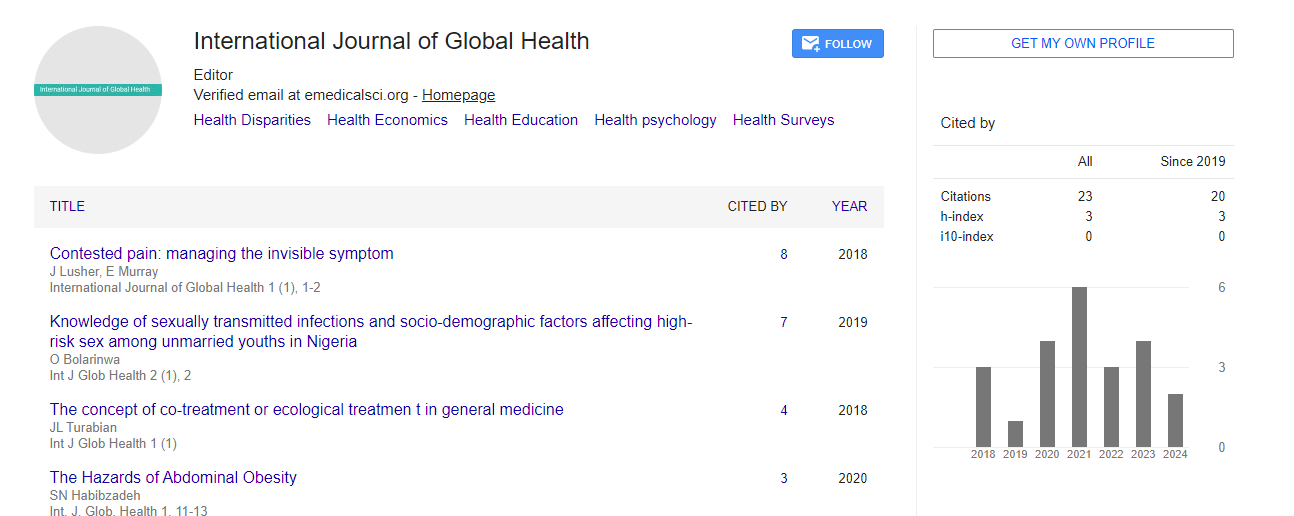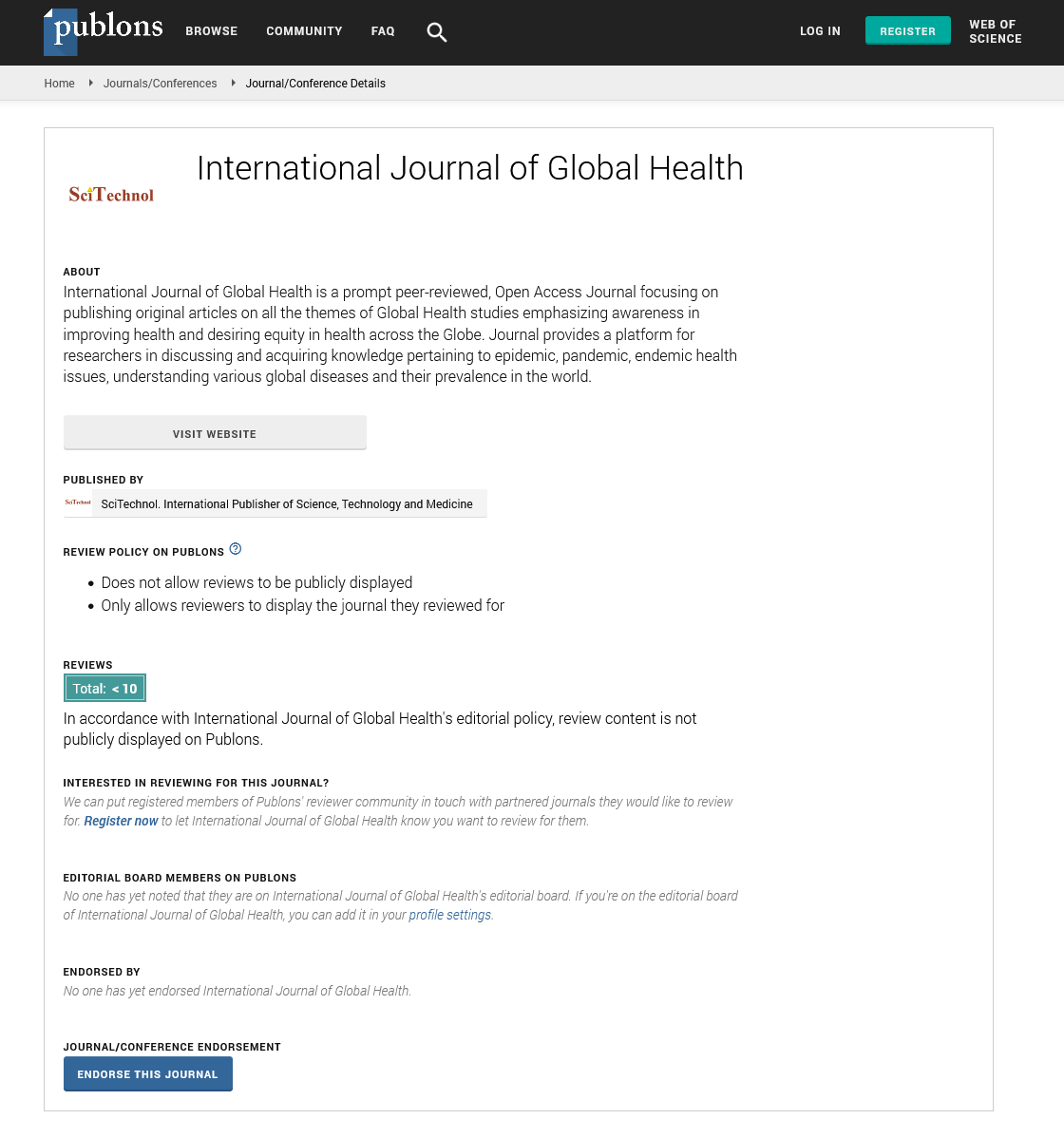Opinion Article, Int J Glob Health Vol: 6 Issue: 4
Advancing Maternal and Child Health: Global Strategies for Sustainable Impact
Haitha Kim*
1Department of Pediatrics, Stanford University School of Medicine, Stanford, CA, USA
*Corresponding Author: Haitha Kim,
Department of Andrology, Johns Hopkins
University School of Medicine, Baltimore, USA
E-mail: Paulhelen2430@gmail.com
Received date: 27 November, 2023, Manuscript No. IJGH-24-125940;
Editor assigned date: 29 November, 2023, Pre QC No. IJGH-24-125940 (PQ);
Reviewed date: 14 December, 2023, QC No. IJGH-24-125940;
Revised date: 21 December, 2023, Manuscript No. IJGH-24-125940 (R);
Published date: 28 December, 2023, DOI: 10.4172/Ijgh.1000193
Citation: Kim H (2023) Advancing Maternal and Child Health: Global Strategies for Sustainable Impact. Int J Glob Health 6:4.
Description
Maternal and child health remains a critical focal point in the broader realm of global public health. The International Journal of Global Health delves into the theme of 'Advancing Maternal and Child Health: Global Strategies for Sustainable Impact,' emphasizing the vital need for comprehensive and enduring approaches to address the distinctive health requirements of mothers and children worldwide. The spectrum of challenges within maternal health encompasses the well-being of women during pregnancy, childbirth, and the postpartum period. Unfortunately, many regions continue to grapple with unacceptably high maternal mortality rates attributed to complications during pregnancy and childbirth, limited access to skilled healthcare providers, and constrained resources for maternal healthcare services. Tackling maternal health demands a multifaceted strategy that surpasses medical interventions to encompass social, economic, and cultural factors influencing women's health outcomes.
Child health is intricately interwoven with maternal well-being, along with broader determinants such as nutrition, sanitation, and healthcare accessibility. The global concerns surrounding childhood diseases, malnutrition, and preventable deaths persist. Fostering the healthy development of children necessitates interventions commencing during pregnancy and extending into infancy and early childhood. Immunization, nutritional support, and access to quality healthcare stand pivotal in reducing child mortality and nurturing long-term health. Achieving sustainable impact in maternal and child health hinges on universal access to quality healthcare services. This includes antenatal care, skilled attendance during childbirth, postpartum care, and essential health services for children. Establishing healthcare accessibility forms the bedrock for global reductions in maternal and child mortality rates.
Nutrition assumes a crucial role in maternal and child health. Strategies for sustainable impact involve the implementation of comprehensive nutrition programs, encompassing prenatal and postnatal nutritional support for mothers and interventions addressing child malnutrition. Education on optimal breastfeeding practices and the introduction of nutritious complementary foods contribute significantly to the health and well-being of both mothers and children. Community-based interventions amplify the reach and effectiveness of maternal and child health programs. Empowering communities with knowledge about maternal and child health, promoting awareness of available services, and engaging local leaders contribute to sustainable impact. Community health workers play a pivotal role by providing education, support, and linking families to healthcare resources.
Immunization stands as a cornerstone of child health. Sustainable impact strategies involve developing and implementing robust immunization programs to shield children from preventable diseases. Additionally, maternal immunization against diseases like tetanus contributes to the health of both mothers and newborns. Sustainable impact strategies involve creating and maintaining strong immunization programs. This includes the development of comprehensive plans that cover a range of preventable diseases. The primary goal of immunization programs is to safeguard children from diseases that are preventable through vaccination. This not only ensures the well-being of individual children but also contributes to the overall health and resilience of the community.
Extending immunization efforts to include mothers is a crucial aspect of sustainable impact strategies. Maternal immunization, for example, against diseases like tetanus, not only protects the health of the mother but also has direct benefits for the newborn. Maternal immunization is essential for preventing the transmission of certain diseases from mother to child during pregnancy and childbirth. This not only safeguards the health of the mother but also contributes to the well-being of the newborn. Sustainability implies not just short-term gains but enduring positive effects. By implementing and maintaining immunization programs, communities can create a lasting impact on public health, reducing the prevalence of preventable diseases over time.
Conclusion
In conclusion, "Advancing Maternal and Child Health: Global Strategies for Sustainable Impact" underscores the imperative of holistic and enduring approaches to address maternal and child health challenges. Sustainable impact requires a comprehensive understanding of the social determinants of health, community empowerment, and global collaboration. By implementing strategies that encompass healthcare access, nutrition, education, and advocacy, the global community can contribute to lasting improvements in maternal and child health outcomes and foster a healthier future for generations to come.
 Spanish
Spanish  Chinese
Chinese  Russian
Russian  German
German  French
French  Japanese
Japanese  Portuguese
Portuguese  Hindi
Hindi 
